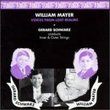| All Artists: Brahms, Dorati, London Symphony, Minneapolis Title: Symphonies 1-4 (Comp) Members Wishing: 0 Total Copies: 0 Label: Polygram Records Release Date: 11/19/1996 Genre: Classical Styles: Historical Periods, Modern, 20th, & 21st Century, Symphonies Number of Discs: 2 SwapaCD Credits: 2 UPC: 028943438025 |
Search - Brahms, Dorati, London Symphony :: Symphonies 1-4 (Comp)
 | Brahms, Dorati, London Symphony Symphonies 1-4 (Comp) Genre: Classical
|
Larger Image |
CD DetailsSimilarly Requested CDs
|
CD ReviewsNot for music virgins Mark McCue | Denver, CO USA | 03/03/2000 (5 out of 5 stars) "This Brahms set is NOT for your standard Music Appreciation 101 bunch. These are not recordings to grow up on...these are the belluga of Brahms, for sophisticated listeners who want something different, something original to ponder, not the usual "musing" Brahms. Beginners are best off with Walter, for example.Dorati came in for a lot of flack when these were issued. The First is very gruff, with power and clarity at the forefront. The LSO is is in top-Dorati form, which is as good as it gets.The MSO in the flowing No.2 caught it from New York critics in '57 at Carnegie Hall while on tour--the papers found the playing hard and wiry. I doesn't sound that way here though, but some of Dorati's tempo selections are slightly odd, but performance adds up to an impression of great originality.The Third and Fourth allow Dorati to bow as one of the masters of Brahms. The performances are enthralling, thrilling, captivating, with glorious orchestral execution of the LSO. Beginners will find these renderings sometimes breathless and bewildering, but those in the know recognize that Brahms LIKED fast tempi, and especially in the Third and Fourth he wants to get a move-on.This set is fascinating listening...and tells us as much about Dorati as a superb artist as it does about Brahms himself." Go old school with these outstanding recordings Matteo | Oakland, CA United States | 09/17/2004 (5 out of 5 stars) "To get to the gist right away: I have yet to come across better recordings of the Brahms symphonies than the ones on this disc. Antal Dorati's interpretative ability, and the playing of the Minneapolis and London orchestras, is fantastic. I have yet to hear anyone wrestle with the passionate moodiness of these works quite like Dorati. He is neither too fleet-footed nor to syrupy. His tempi seem just right and he truly seems to understand these works. He attacks the music with intelligence and, just as important, with vigor! Dorati seems to understand the Romantic temperament that went into composing these symphonies and, because of this, other recordings I've heard seem anemic by comparison. I highly recommend these to any fan of Brahms or the Romantic symphony. Hopefully you'll find yourself as entranced by these recordings as I am." Very Good cycle made great by a transcendent 3rd and 4th Joey Joe Joe Jr. Shabadoo | Boston, MA USA | 05/16/2008 (5 out of 5 stars) "First off-this is not a starter Brahms set. No, if you're new to Brahms, you'd best seek out Klemperer, Haitink, Karajan or Walter. Dorati offers an extremely unique and exciting take on the Brahms cycle, and any avid, well-schooled fan of the composer would do well to acquire these. The LSO under Dorati features the distinctively incisive Eastern-European style of playing that really allows one to fully appreciate Brahms' ingenious use of counterpoint in the development sections. Textures are transparent, but not lightweight. This finer approach helps for the work of a composer whose musical compositions are so densely orchestrated they can sometimes go awry in the hands of lesser conductors...but not Dorati. Dorati submits a fine account of the First, with a transcendent first movement - his concise and direct approach helps rein in this colossal structure while he expertly maintains the movement's architectonics and seemingly inevitable momentum. The middle movements are also well executed, but unfortunately there are some problems in the finale. A senseless rush to the Coda is followed by an equally senseless deceleration at the very finish. I'm not sure what Dorati was thinking here, and it mars what for me was an otherwise excellent performance. The Second here was played by the MSO, rather than the LSO; and unfortunately that ensemble sounds markedly thinner, with hard and edgy strings. This kind of sound is all wrong for such an unconflicted work as the this, and sadly the proceedings suffer as a result. And while the inner movements are for the most part well-executed, the opening movement has some intonation and ensemble problems, and the finale is again rushed, and this time sloppy as well. It's a shame Dorati didn't record this piece with the LSO, whose deeper, richer string tone and tighter ensemble work may have helped immensely. With all that being said, the reason this disc receives 5 stars is due to the two late symphonies. Here, Dorati is in his element, carefully guiding the proceedings into perfectly balanced and constructed performances of the highest calibre. There are no issues in the finales here, or in any other movements for that matter. The results are simply stunning. The tempo choices may be a bit faster than in many other versions, but it suits the music well and helps infuse the readings with an electricity rarely seen in the somewhat thicker and murkier interpretations of other more popular conductors. Some of his choices may initially bewilder you, but there's a palpable sense of momentum and space here that often get lost under all of Brahms' layers. Dorati, like the true master of Brahms he is, avoids any such pitfalls and leaves us with two utterly towering interpretations. I remember the shock and excitement I felt upon hearing these for the first time and realizing that these were the performances I had been waiting for.
The sound is very good, with the exception of the 2nd which is due in large part the MSO's overall tone. Mercury's Living Presence series was a technological marvel in its day, and as a result these recordings still sound quite fresh almost 50 years later. This is vintage 1960s analog, with good dynamic range and a great deal of detail. It may not be flawless but it certainly never gets in the way of the music. Highly recommended. Of the many Brahms cycles I own, and the Third and Fourth included on this cycle are at the very top of the heap. Since this is out of print and becoming very expensive, I might suggest you also consider Ernest Ansermet's cycle on Australian Decca, which is of a similar interpretive bent and is in-print and reasonably priced. " |

 Track Listings (8) - Disc #1
Track Listings (8) - Disc #1








